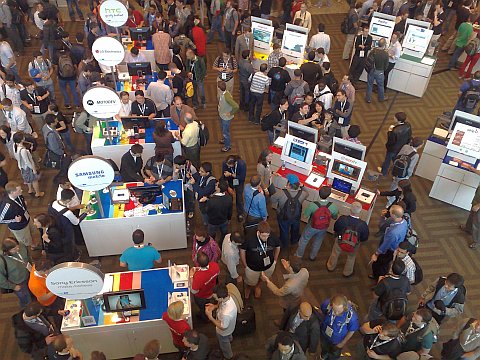
The theme of today’s I/O keynote was Google’s commitment to HTML5 and web apps. The day’s significant announcements all lend support to Google’s web centric vision of the future:
- Google announced that it has open sourced the high performance VP8 video codec that Google acquired through their acquisition of On2. VP8 packaged with the Ogg Vorbis audio codec in the Matroska container format make up WebM, a new web video standard that is 100% open source and royalty free. WebM is available now. YouTube is encoding all new HD videos with it. All the major browser vendors, except for Apple, are already or will soon be supporting it. WebM support is included in today’s Firefox nightly build and Opera and Chrome Betas that are available now. Microsoft has promised to support WebM in a future IE release. .
- Google App Engine for Business, which includes SQL and SSH support, a service level agreement and new per user pricing model was announced.
- The Chrome Webstore for web apps was previewed. The Webstore is intended to facilitate web app discovery and make it possible to sell web apps just like native apps.
Several new web apps were demoed: Clicker, a search engine and directory for web video, photo editor MugTug and an online version of Sports Illustrated magazine that mirrors the look and feel of the print version but also includes interactive features in both content and ads.
Apart from the keynote, Google also announced:
- That Google Wave is now open to all, no invitation required.
- An early Beta of Google Storage for Developers, a new cloud data storage platform competing with Amazon S3.
- The Google Font API, a library of quality open source web fonts.
- Enhancements to the Feed and Google Maps APIs.
On the surface very little of today’s announcements seems to apply to mobile. But I feel it was a big day for mobile, especially mobile web. Sure, the Chrome WebStore, WebM and the web apps were presented in the context of the desktop web. But make no mistake, Google considers HTML5 and web apps the future of mobile too. At a press conference after the keynote, Sergy Brin said he felt that the more limited hardware of mobile devices favored native apps for now, but that in a year or two desktop and mobile HTML5 capabilities will converge. What is happening now in the desktop browser is coming soon the mobile browser.
Based on several hints that Vic Gundrota dropped today, the big announcements are tomorrow and will be Android and mobile related. That will almost certainly be Android 2.2 (Froyo) and Google’s much rumored TV initiative. I’m sure there will be some surprises as well. The Chrome Webstore seems a natural for the browser centric Chrome OS. A Chrome tablet would be a nice followup.